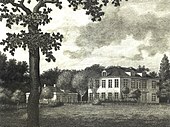Johann Arnold Günther
Johann Arnold Günther (born April 9, 1755 in Hamburg ; † August 20, 1805 there ) was a Hamburg senator and enlightenment officer .


The son of the wealthy Hamburg businessman of the same name, Johann Arnold Günther, became interested in literature from an early age. When he was 14, his father took him out of school and sent him to the office . He postponed reading to the night, resulting in myopia. Thanks to his publications in the “Hamburgische Address-Comtoir-Nachrichten” and in “ Wandsbecker Bothen ” Günther was able to visit the Johanneum and the Academic Gymnasium , where Johann Georg Büsch and Christoph Daniel Ebeling were his teachers. By winning the lottery, a library was built with works by Martin Opitz and poems by Michael Richey . From 1775 Günther studied law and camera science, history and statistics at the University of Göttingen ; In 1778 he received the Licentiate . He continued his legal training in the central locations of the Old Kingdom of Wetzlar , Regensburg and Vienna . In Wetzlar he was strongly influenced by Goethe's book The Sorrows of Young Werther . Socially and culturally significant letters have come down to us from his time in Wetzlar. A trip took him to southern Germany, Austria, Hungary and Bohemia. In 1780 he returned to Hamburg. In 1781 he married. However, the marriage remained childless. He joined the non-profit Patriotic Society in 1781, a year later he was already chairman and in 1790 he became its secretary. From 1783 he belonged together with Büsch and Friedrich Gottlieb Klopstock to a monthly table party. In 1788 Günther played a key role in the founding of the general poor institution together with Büsch, Nicolaus Matsen and Caspar Voght . The democratic constitution of the Patriotic Society of 1789 was largely his work. This enabled him to significantly increase the number of members.
His charitable work was decisive for his election to the Senate in February 1792. A little later he won first prize in a Viennese competition with his contribution to the question “How usury can best be controlled without criminal laws”. In the Senate he continued his charitable work and drafted new medical and fire fund regulations. In 1796, under the impression of the Enlightenment, charity and sensitivity, he traveled through Germany and Switzerland. The constitution of Zurich and the government of Bern made a deep impression on him. He wrote a biography about the enlightener Peter Dietrich Volkmann , which is an important source for Hamburg's politics and administration. Günther wrote numerous articles for the "negotiations and writings" of the Patriotic Society, which he founded. In 1801 he wrote the article "Samples of a picture gallery of 18th century Hamburg men " for the " Hanseatische Magazin " by Johann Smidt
Since 1797 his work was increasingly impaired by diseases. Günther found relaxation in his country house in Hamm . Günther found his grave in the Hammer Friedhof near the Trinity Church . In a will, he bequeathed his library of 8,200 volumes to the Patriotic Society. In 1842 it was destroyed in the Hamburg fire . Günther's work was recognized posthumously by the Allgäu enlightener and writer Christian Jacob Wagenseil and the canon Friedrich Johann Lorenz Meyer , his successor as secretary of the Patriotic Society. In 1863, Güntherstrasse in Hamburg-Hohenfelde was named after him.
literature
- Otto Beneke: Günther, Johann Arnold . In: Allgemeine Deutsche Biographie (ADB). Volume 10, Duncker & Humblot, Leipzig 1879, p. 174 f.
- Werner Kayser: Senator Johann Arnold Günther. A Hamburg book collector in the late 18th century , Philobiblon, Vol. 24 (1980), pp. 176-210.
- Franklin Kopitzsch : Günther, Johann Arnold . In: Hamburgische Biografie Vol. 5, Göttingen 2010, pp. 158-160, ISBN 978-3-8353-0640-0 .
- Franklin Kopitzsch: Basics of a social history of the Enlightenment in Hamburg and Altona . 2nd, supplemented edition, Hamburg 1990, ISBN 3-923356-36-6 .
Remarks
- ↑ without a name: Samples of a picture gallery of Hamburg men of the eighteenth century. In: Hanseatisches Magazin. Volume 5, No. 1. (1801), pp. 115-169.
- Jump up ↑ without name: Directory of the library which the Hamburg Society for the Advancement of the Arts and Useful Trades left behind in 1805 by its well-deserved member, Senator Johann Arnold Günther Lt.DR. Hamburg 1806 ( online )
| personal data | |
|---|---|
| SURNAME | Günther, Johann Arnold |
| BRIEF DESCRIPTION | Hamburg senator and scout |
| DATE OF BIRTH | April 9, 1755 |
| PLACE OF BIRTH | Hamburg |
| DATE OF DEATH | August 20, 1805 |
| Place of death | Hamburg |
